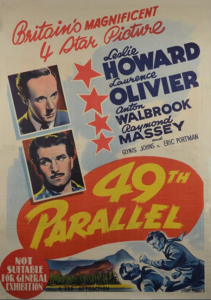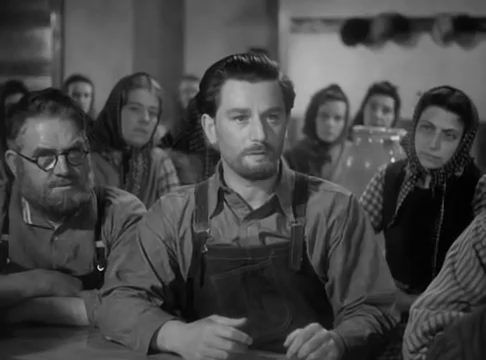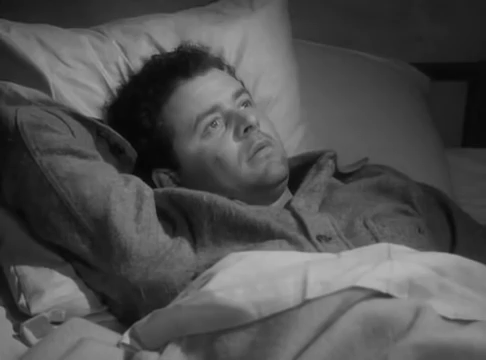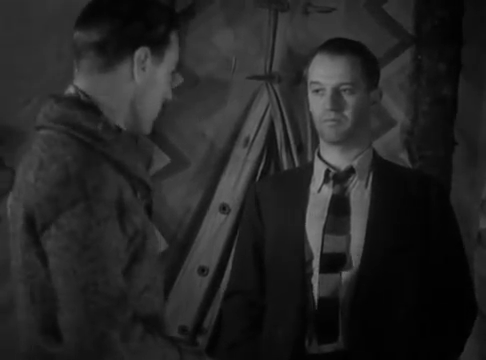“It’s not the Canadian people we’re against; it’s your filthy government.”
|

Synopsis:
When their U-Boat sinks in Northern Canada, a Nazi naval lieutenant (Eric Portman) and five of his men (including Raymond Lovell and Niall MacGinnis) attempt to make their way across the border to neutral America. During their undercover journey they meet a lusty French-Canadian trapper (Laurence Olivier), a peace-loving Hutterite leader (Anton Walbrook), an art-loving writer (Leslie Howard) living among Indians, and an AWOL Canadian soldier (Raymond Massey).
|
|
Genres, Themes, Actors, and Directors:
- Anton Wolbrook Films
- Fugitives
- Glynis Johns Films
- Laurence Olivier Films
- Leslie Howard Films
- Michael Powell Films
- Nazis
- Niall MacGinnis Films
- Raymond Massey Films
- World War II
Review:
Just prior to forming their production company The Archers, Michael Powell and Emeric Pressburger made this propaganda film specifically to persuade neutral United States to enter the war against Germany (though by the time it was released, they were already involved). Powell and Pressburger’s unique stance is one of making Nazi fugitives the protagonists, meaning we can’t help but somewhat relate to their plight while simultaneously detesting their beliefs and actions. A host of big-name actors lend their heft to snippets of the storyline, beginning with Laurence Olivier sporting a heavy French-Canadian accent as a trapper recently returned from his trade and shocked to find that Canada is at war, and ending with Massey in a heroic turn as an AWOL soldier who does the right thing for his country. Most affecting is the sequence taking place among Hutterites, where MacGinnis is reintroduced to his craft as a baker — and thus remembers what a “good life” really consists of — and Walbrook plays a calm and composed leader. While it’s not must-see viewing, this film remains worth viewing once for its historical interest.
Redeeming Qualities and Moments:
- Anton Walbrook as Peter

- Niall MacGinniss as Vogel

- Freddie Young’s cinematography


Must See?
No, but it’s certainly worth a look. Listed as a film with Historical Importance in the back of Peary’s book.
Links:
|
One thought on “49th Parallel (1941)”
A once-must, as an all-round good (and compelling) ‘what if’ show. As per my 5/19/21 post in ‘The ’40s-’50s in Film’ (fb):
“Do not forget: You are the first of the German forces to set foot on Canadian soil, the first of many thousands. Be worthy of that high honor.”
’49th Parallel’ (1941): Fans of the Pressburger / Powell one-two punch of ‘Black Narcissus’ and ‘The Red Shoes’ would do well to check out this earlier collaboration, their third film together. (I hadn’t seen it before.) Powell had been approached by the British Ministry of Information to make a propaganda film; he set out to make one that would “scare the pants off the Americans” so that they would join in the fight against Hitler. (The upshot was that, by the time the film was released in the States, America was already involved.)
The film’s title is a reference to the Canadian-American border, “the only undefended frontier in the world”. A German U-boat makes headway towards that area, with its crew thinking they will be undetected. While the boat is destroyed, that is only after a small surveillance group has gone ashore. It will be up to that group to carry out the work of the Fatherland.
While this film starts out as a fairly standard war tale, it soon becomes something consistently tense and often riveting. The surviving German troop turns the story into a sort of road film, as it finds itself in a series of situations armed with resistance.
Characters along the way include: Laurence Olivier as a French-Canadian trapper (with a surprising accent); Anton Walbrook as the leader of a religious settlement similar to the Amish (who is given a speech that is simply mesmerizing); Glynis Johns, quite memorable as a young member of that community; Leslie Howard as a writer who finds unexpected strength in the face of Nazis (and is given one of the film’s best lines: “Well, I never would have believed that grown-up men could behave like spiteful, little schoolboys.”); Raymond Massey as an AWOL Canadian soldier (the only time the Canadian Massey ever actually played a Canadian).
Notable in the German troop is Niall MacGinnis – here effectively playing a sympathetic role but, years later, the actor would gain notoriety as the evil nemesis in Tourneur’s ‘Curse of the Demon’.
Pressburger won an Oscar for his screenplay.